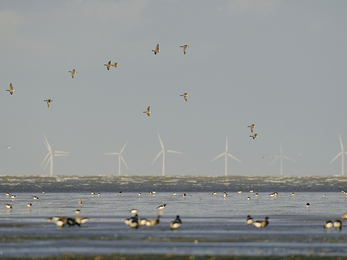Last week, the Government approved Hornsea Three Offshore Wind Farm – a vast development in the North Sea off the Norfolk coast which could end up covering an area of 696 sq km with wind turbines. This will have a huge impact on marine habitats and sea life.
The Wildlife Trusts support actions to tackle climate change. We welcomed the Government’s commitment to implement the Paris agreement (2015), the commitment to achieve net-zero 2050 and the declaration of a climate emergency. However, it must be recognised that as a society, we also face an ecological emergency; this and the climate emergency are inextricably linked. Healthy ecosystems play an essential role in carbon storage. Climate change cannot be stopped unless we stop destroying important natural habitats and take action to restore ecosystems. In short, we cannot tackle climate change unless we halt the biodiversity crisis.
That is why we are pleased that the government has followed the rules and approved Hornsea Three offshore wind farm with the essential proviso - that compensation will be made for harmful impacts of the development to two Special Areas of Conservation (SACs) and one Special Protection Area (SPA). However, The Wildlife Trusts have serious concerns regarding the compensation currently being offered and we are looking forward to working with both BEIS and Orsted to develop compensation which will allow the marine environment to recover.
Joan Edwards, Director of Marine Conservation and Public Affairs at The Wildlife Trusts said “The government has made the right decision in opting to compensate for damage to internationally-important areas at sea. But the challenge now is for all involved, including BEIS, Defra, The Crown Estate, industry and ourselves, to have a rational conversation on what we do next to ensure that the ambitious target of 75-100GW of offshore wind farm energy can be delivered whilst also securing recovery in the marine environment too. If we don’t succeed in securing serious compensation for the damage to nature we will be taking our concerns to the newly formed Office of Environmental Protection.”

